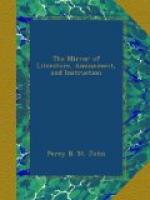The Khans and Meerzas of Bebuhan are considerable consumers of coffee, but not after the fashion of Turks, Arabs, or Europeans. It is with them a kind of bon-bon eaten in a powdered and roasted state, without having had any connexion with hot water. When Meer Goolam Hussein called on me, he was always accompanied by his coffee-bearer, who carried about the fragrant berry in a snuff-box, and handed it frequently to the company present. The first time it was brought to me, deceived by its colour and quality, and strengthened in the delusion by its singular repository, I took a pinch of the coffee and applied it to my nose, amidst the roars of laughter and looks of surprise of all the party.
(A vestry dinner in Persia must be one of our selections.)
At the convent of Julfa the governing bishop and his confreres have ample room, plenty of society, and a well furnished table. I dined once with his lordship and the churchwardens, and found that vestry honours and vestry appetites are not exclusively English characteristics. The dinner was spread as usual on the ground, on a large white cloth, around which the guests assembled. Placed opposite each guest was a plate, knife, fork, spoon, and glass, a piece of cheese, two or three feet of bread, and a hard boiled egg. The feast commenced by each person drinking a dram of aniseed; then came in quick succession mutton chops, boiled fowls, boiled kidneys, sour curds, tea, apricots, apples, and grapes, sweetmeats, and salt fish; to each of which laymen and churchmen did equal justice, finishing the feast with a sacrifice to Bacchus.
* * * * *
THE PUBLIC JOURNALS.
* * * * *
BOYHOOD OF CRANMER—SCHOOLS BEFORE THE REFORMATION.
Cranmer received his early education from a parish-clerk. This may seem singular, for he was of gentle blood, and was entered at Cambridge amongst “the better sort of students.” But probably such shifts were not unusual before the Reformation. The monasteries indeed had schools attached to them in many instances. In Elizabeth’s time a complaint is made by the Speaker of the Commons, that the number of such places of education had been reduced by a hundred, in consequence of the suppression of the religious houses. Still it must often have happened (thickly scattered as the monasteries were) that the child lived at an inconvenient distance from any one of them; mothers, too, might not have liked to trust less robust children to the clumsy care of a fraternity; and probably little was learned in these academies after all. Erasmus makes himself merry with the studies pursued in them; and it is remarkable that no sooner did the love of learning revive, than the popularity of the monasteries declined. For thirty years before the Reformation, there were few or no




